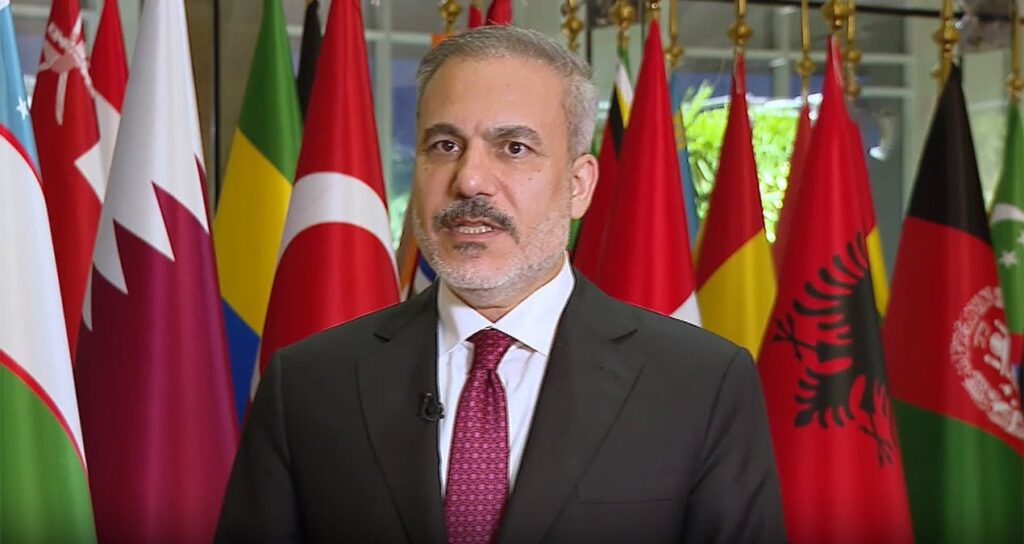In a recent address, Foreign Minister Fidan conveyed Turkey’s unwavering support for Qatar amid ongoing geopolitical tensions during the Foreign Ministers Meeting of the Islamic Cooperation Organization and Arab Cooperation Organization in Doha, Qatar. The minister articulated concerns over Israeli expansionism and the humanitarian situation in Gaza, stressing the need for regional unity and action. He further emphasized the crucial role of Qatar in mediating efforts for peace and stability in the region, highlighting the complex interplay of international relations that impacts the Middle East.
| Article Subheadings |
|---|
| 1) Turkey’s Solidarity with Qatar |
| 2) Analyzing Israeli Expansionism |
| 3) The Role of the United States in the Region |
| 4) Addressing Regional Security Concerns |
| 5) Qatar’s Mediating Efforts |
Turkey’s Solidarity with Qatar
During his recent address to Al Jazeera Arabic and Qatar TV following the Foreign Ministers Meeting in Doha, Fidan emphasized Turkey’s strong support for Qatar, stating, “I would like to convey my sincere love and greetings to the people of Qatar.” The meeting aimed to discuss critical international and regional measures needed to confront shared challenges. The minister conveyed that Turkey stands firmly with Qatar’s leadership and the broader Arab and Islamic community in the face of adversity. In light of escalating conflicts in the region, especially concerning the Palestinian-Israeli conflict, Fidan noted that the situation reflects a broader pattern of aggression and adversity facing the region’s states.
Analyzing Israeli Expansionism
Fidan analyzed the current climate of Israeli expansionism, identifying it as the most pressing issue affecting regional stability. He outlined two primary motivations behind Israel’s expansionism: the desire to enlarge its territorial reach and to weaken its neighboring nations, particularly Syria and Lebanon. Fidan expressed concern that Israel’s actions not only threaten Palestinian sovereignty but also contribute to a wider geopolitical instability. He remarked on the ongoing military operations in Syria and criticized them as harmful to both Syria and the broader Middle Eastern context. By fostering divisions, particularly among neighboring nations, Israel aims to solidify its position of power at the expense of regional unity and security.
The Role of the United States in the Region
Fidan continued to express discontent with the United States’ approach to its alliances in the Middle East, particularly concerning Israel. He explained, “In the American political system, when it comes to the relationship with Israel, there is an exception.” This perceived bias has led to frustrations within the region, as leaders feel slighted and their countries’ interests undermined. Although the Turkish government maintains a positive relationship with the U.S., those ties are complicated when viewed through the lens of regional developments exacerbated by Israeli actions. He pointed out that these challenges not only jeopardize Israel’s relationship with its neighbors but also weaken America’s standing among its traditional allies.
Addressing Regional Security Concerns
Fidan highlighted the necessity for Arab and Islamic nations to unify against shared threats, particularly those stemming from Israeli actions. He insisted that regional security must be reinforced through solid and institutional frameworks. “The region must overcome problems related to sovereignty, security, and territorial integrity,” he stated, underscoring a collective approach to these issues. The urgency to define the problem, according to Fidan, goes beyond the borders of Palestine and delves into the realm of geopolitical maneuvering by Israel, which he characterized as aggressive and expansive.
Qatar’s Mediating Efforts
In conclusion, Fidan affirmed Turkey’s appreciation for Qatar’s mediating role during this turbulent period. He stated, “We find the mediation of Qatar very valuable and we support it from the beginning.” The minister recognized Qatar’s ongoing efforts in facilitating dialogue and promoting ceasefire agreements amid conflict, considering it a vital component for peace in the region. He emphasized that such diplomatic initiatives help bridge divides and contribute to stability, especially in the face of increasing hostility. Fidan’s remarks underscore the collaborative spirit necessary to navigate the complexities of the region in search of common ground and effective solutions.
| No. | Key Points |
|---|---|
| 1 | Turkey expressed its unwavering support for Qatar amidst regional tensions. |
| 2 | Israeli expansionism was identified as a major threat to regional stability. |
| 3 | The United States’ relationship with Israel affects its standing in the Arab world. |
| 4 | There is an urgent need for regional countries to unite against Israeli aggression. |
| 5 | Qatar’s role in mediating discussions for peace is viewed positively by Turkey. |
Summary
In summary, Foreign Minister Fidan‘s remarks during the recent diplomatic meeting in Doha capture the heightened tensions in the Middle East while outlining a framework for collective action. With Turkey standing firmly alongside Qatar and advocating for regional unity against Israeli expansionism, the issues at hand reflect deep-rooted geopolitical complexities. The cooperation and mediation efforts led by Qatar illustrate the potential for dialogue and resolution, though significant challenges remain. Fidan’s insights emphasize the urgent need for collaboration and strategic thinking among Arab and Islamic nations to achieve sustainable peace and security in the region.
Frequently Asked Questions
Question: What are the key themes of Fidan’s address in Doha?
Key themes include Turkey’s support for Qatar, the dangers of Israeli expansionism, and the necessity for regional cooperation to tackle shared challenges.
Question: Why is Israeli expansionism considered a threat?
Israeli expansionism poses a threat as it undermines regional stability, escalates conflicts, and seeks to weaken neighboring Arab and Islamic states.
Question: How does the U.S. relationship with Israel influence Arab nations?
The U.S. relationship with Israel complicates America’s standing among Arab nations, leading to perceptions of bias that could diminish trust and alliances in the region.
